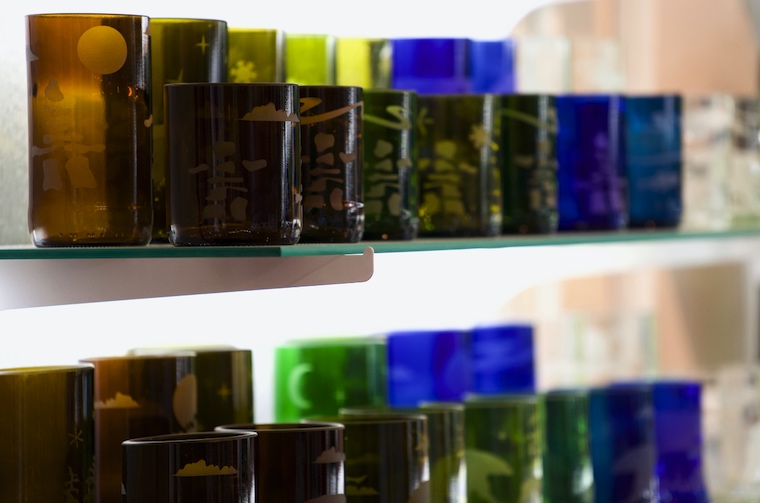A whirlwind tour of Old Town Glassworks in Yellowknife takes about 10 minutes, though one could spend years trying to trace the materials that make up its inner workings to their source. Like its products—artfully etched drinking glasses and decorations made from discarded bottles—its tools all have past lives: a repurposed Hoover washing machine now polishes bottles; ball bearings welded on to coat hangers are used to tap glass apart; a catering tray, flattened and electrified, warms etching stencils.
In a sense, even the building itself is recycled—a set of Hudson’s Bay Company staff houses that have been corralled into a single compound, bikes in various stages of rideability and stacks of glass bottles littered between them in an order known only to Glasswork’s founder Matthew Grogono and his colleagues. Hardly the kind of space you’d expect to generate annual revenue that can reach half a million dollars a year.
In many respects, the eclectic property is a manifestation of Grogono’s personality. Quick-witted and jittery, with a mischievous smile, he is a dreamer in the grand tradition of northern dreamers. He founded Glassworks in 1994—and spent the next 10 years figuring out how to make it profitable—as a protest against the wastefulness he saw everywhere around him.
At the time, Yellowknife was drowning in trash. The city had spent $250,000 on a consultants’ report that came back with the novel idea of crushing garbage and stacking it by the airport. But it wasn’t just trash that was the problem, to Grogono’s mind. It was an entire culture of pollution and waste. Waste diversion simply wasn’t on the table. “‘We’re a mining town,’” he recalls being told by then-mayor Pat McMahon, explaining that recycling would never work in the North. “‘We make it. We break it. We throw it away.’”

That did not sit well with Grogono, the son of English parents who had lived through the Second World War and its famous thriftiness. “I’ve always been very frugal,” he says. So when he saw City Council members going through what he estimated to be at least 2,000 styrofoam cups a year for coffee and water at council meetings, he decided to prove a point. He took a dozen wine bottles, cut them into water glasses and presented them to the council as Christmas gifts. (The glasses are still in use today.)
Grogono’s protest developed into a sort-of business. But while Old Town Glassworks made an important statement about Grogono’s values and insight, keeping it going weighed heavily on his personal finances. Then, in early 2000, a small group of customers came into his shop, looking for a glass with a polar bear etched into it. Grogono was out of stock, so: “I said, no problem, we’ll just go out back and make a glass.” After showing the customers how to make an etching, the shop in the front got busy again, and Grogono returned to tend to his customers.
“After half an hour, I thought, ‘oh shit, I forgot about them.’ I went back there and they said, ‘well, we hope you don’t mind, we made two or three extra.” The proverbial light bulb went off over Grogono’s head: He could offer glass-making workshops to paying customers. Those workshops have become the core business at Old Town Glassworks—now a staff-owned cooperative—and are the backbone of the company’s earnings.
And Grogono isn’t finished. He’s now working on a $5-million business plan to convert a nearby two-storey Hudson’s Bay Company warehouse into an artist-run learning centre. “You can’t do anything without space,” he says.










